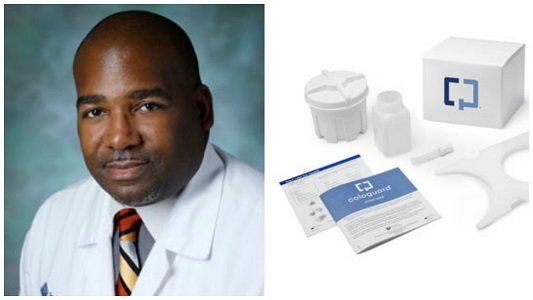March is National Colon Cancer Awareness Month, an important time to talk about the second-leading cause of cancer-related death and yet, one that many people feel uncomfortable discussing. Colon cancer can affect anyone, man or woman, and especially those ages 50 and above, so it’s critical to understand your risks and what you can do to protect yourself.
This year alone, more than 95,000 Americans— including 2,400 in Maryland—will be diagnosed with colon cancer and more than 50,000 will die from the disease. While colon cancer does not discriminate, African Americans are more likely to die from the disease than any other group.
The good news is that colon cancer can be treated effectively when diagnosed early and even prevented. This is because colon cancers develop slowly, first showing up as a polyp— or non-cancerous growth— that can take years to become cancer. If these polyps are found early through routine screening and removed, doctors can effectively prevent cancer from ever forming. And with early diagnosis, the chances of surviving colon cancer are high.
The challenge is that many men and women aren’t taking the proper precautions. Despite American Cancer Society guidelines that call for those at average risk to begin colon cancer screening at age 50, 23 million Americans in that age group don’t follow through, increasing their risk of a late-stage diagnosis when treatment is difficult and survival rates are low.
There are a number of reasons why people avoid screening, including discomfort, embarrassment and even fear. Colonoscopy is the standard for colon cancer screening because doctors are able to detect cancerous and precancerous lesions, as well as remove them, during a single procedure. The problem is that some patients are unable or unwilling to undergo colonoscopy for medical or personal reasons.
For people looking for alternative screening options, there are noninvasive tests, such as fecal occult blood tests (FOBT) and fecal immunochemical tests (FIT). These tests look for blood in the stool that may be caused by a polyp or cancer. However, because there are unrelated conditions that can cause blood in the stool, and not all polyps or lesions actively bleed, these tests may not be reliable on their own for the detection of cancer or pre-cancerous polyps.
Another option approved by the U.S. Food and Drug Administration (FDA) called Cologuard offers patients an accurate, noninvasive screening option that they can take in the privacy of their own home. What makes Cologuard different from other noninvasive colon cancer screening tests is that it looks for both blood and altered DNA from abnormal cells known to be associated with cancer and pre-cancerous polyps that are shed into the stool as it passes through the colon; this makes the test more accurate than other noninvasive options.
The best part is that Cologuard requires no prep or dietary restrictions. The test is prescribed by a doctor and sent directly to the patient’s home. After completing the collection process, the kit is sent back to the lab through a pre-paid mailer. If the test result is positive, the doctor will refer the patient for a diagnostic colonoscopy. If the result is negative, the patient should continue to participate in a screening program at an interval and with a method appropriate for the individual patient.
In a study published in the New England Journal of Medicine, Cologuard was highly sensitive in detecting colon cancer—in fact, it was able to detect 92 percent of cancers in average risk patients with 87 percent specificity.
The bottom line is that colon cancer screening saves lives. The best test is one that gets done— so don’t put it off any longer, March is the perfect time to call your doctor and check colon cancer screening off your to-do list.
To learn more about all of your screening options, contact the physicians at Digestive Disease Associates in Catonsville or Columbia at 410-247-7500.
Dr. Thomas Abernathy is a board certified gastroenterologist at Digestive Disease Associates and a diplomate of the American Board of Internal Medicine. He is also a member of the American Gastroenterology Association; the American Society of Gastrointestinal Endoscopy; the American College of Gastroenterology; the American Association for the Study of Liver Diseases and the National Medical Association.
